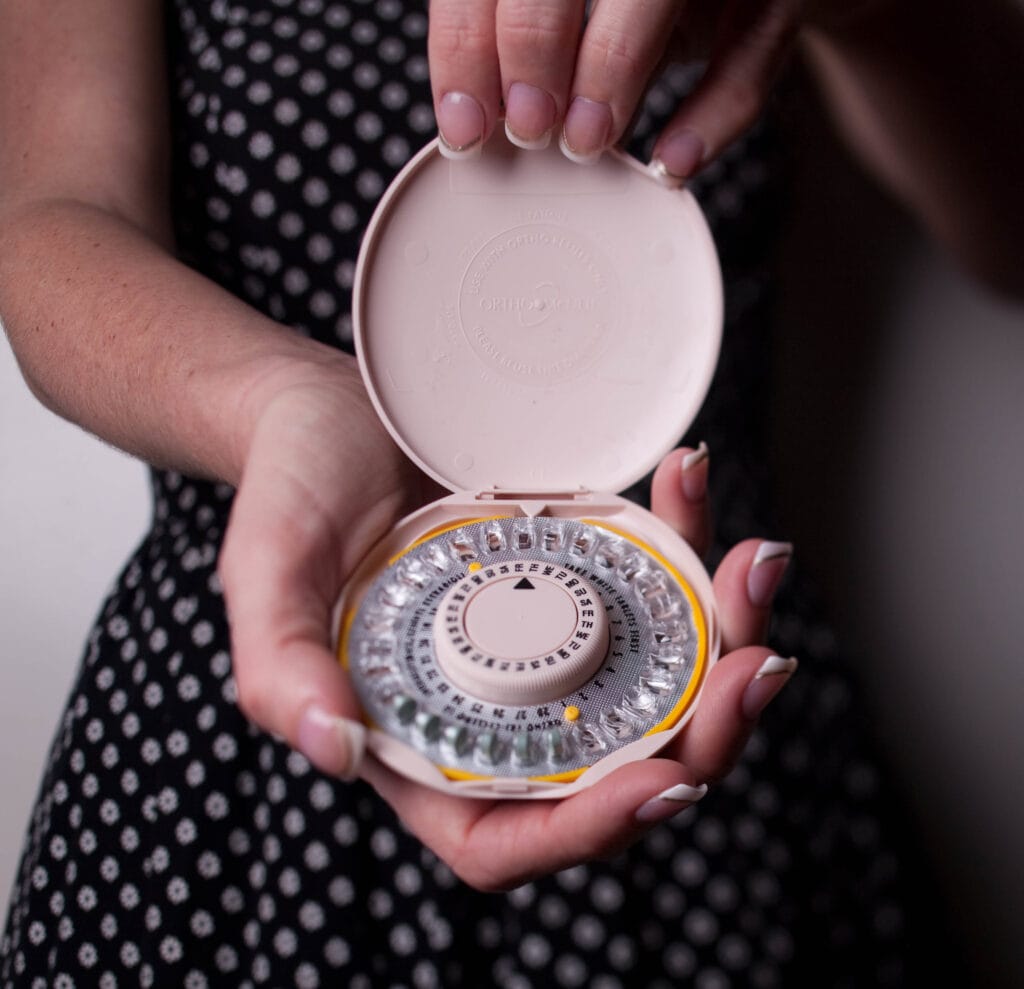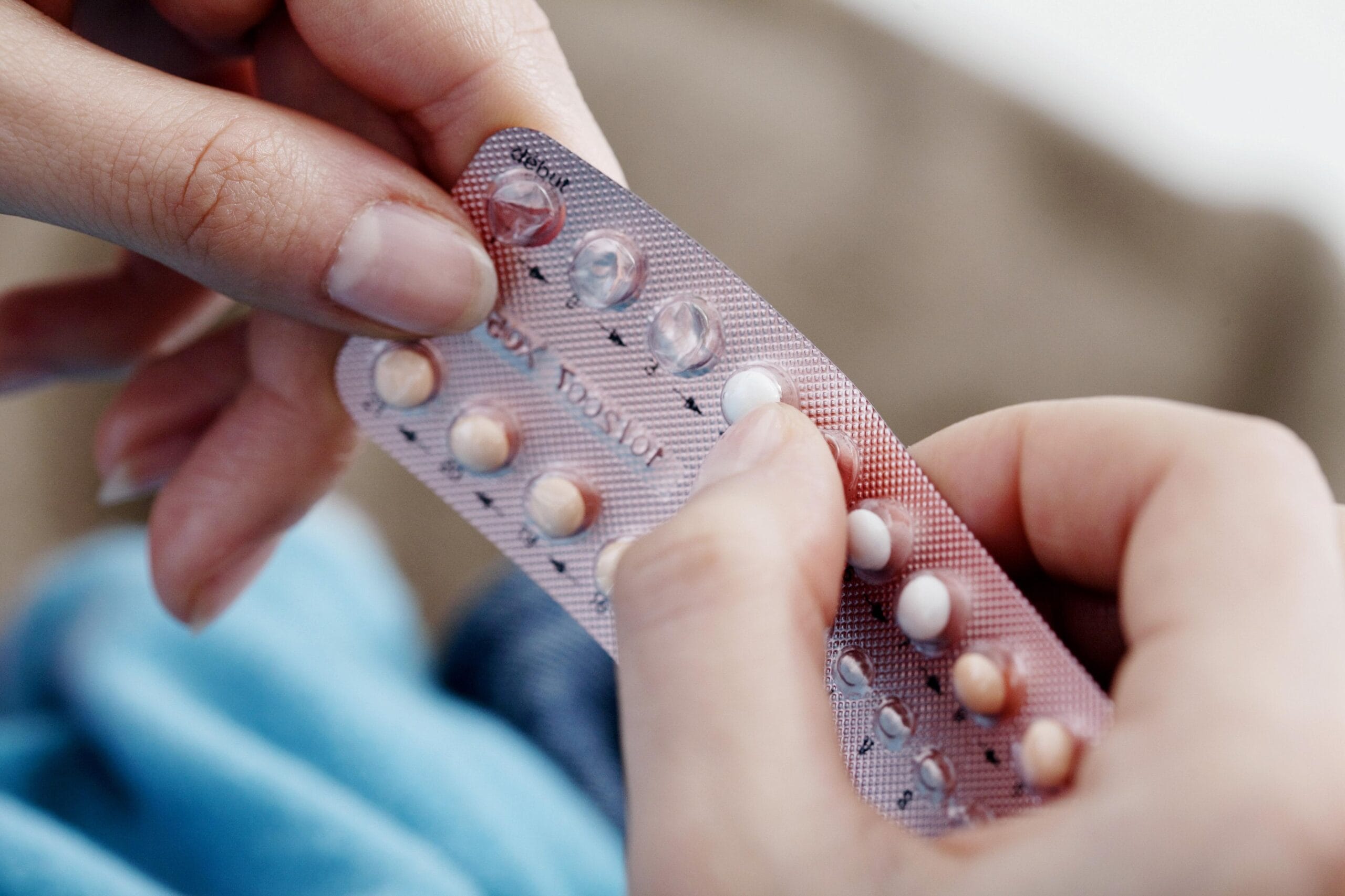Hormonal contraception is one of the most popular ways to protect against unwanted pregnancy. We decided to check several myths that are associated with this method of birth control.
The idea of contraception by introducing synthetic hormones into the body appeared in the middle of the 20th century. The first hormonal drug was in the form of tablets, it was called Enovid and went on sale in 1961. Now pharmaceutical companies offer Women have a wide choice of hormonal contraception:
- oral contraceptives (OC);
- vaginal rings and intrauterine devices with hormones;
- hormonal patches;
- subcutaneous implants and intramuscular injections.
If the drug contains only progestins (synthetic analogues of female sex hormones progestogens), such a contraceptive is called progestogen-containing (PSC), and if progestins and estrogen, then combined. Pills containing both hormones are called combined oral contraceptives (COCs).
Progestins and estrogen "freeze"The natural cycle of a woman in the first phase prevents the maturation and release of the egg from the follicle, as well as the thickening of the endometrium, which does not allow the sperm to attach to the smooth wall of the uterus.
Hormonal contraception is considered extremely reliable - the Pearl index, showing how many women became pregnant using this method correctly, for these drugs amounts to only 0.3–0.6. For comparison, the Pearl index for the male condom equals 2, and for interrupted sexual intercourse - 6.
Is it true that taking hormonal contraceptives increases the risk of cancer?
No less excess weight, as a possible consequence of taking hormonal contraceptives, women afraid oncological diseases. Questions about probabilities development of such pathologies Due to the use of this method of contraception, women ask on resources dedicated to female health, and specialized forums.
Consistent evidence has been obtained for several types of cancer and some forms of hormonal contraception. So, taking hormonal drugs does not increase, but, on the contrary, reduces the risk of developing ovarian cancer by 30–50%, endometrial cancer by 30%, and colorectal cancer by 15–20%. Interestingly, this is a long-term effect of the drugs, meaning the risk remains reduced up to 30 years after the woman has stopped taking the pills. The protective effect against ovarian cancer was observed even in patients with a mutation in the BRCA1 or BRCA2 genes, which are associated with an extremely high likelihood of developing ovarian and breast cancer.
There is no scientific consensus on the role of hormonal contraception in the development of two other types of cancer: cervical and breast. A 2003 meta-analysis by the International Agency for Research on Cancer (France) showedthat the risk increases by 10% after less than five years of use, by 60% after five to nine years of use, and doubles after ten or more years of use. At the same time, cessation of the use of COCs leads to a gradual reduction in risk to average population values, and ten years after the cessation of the use of such contraceptive methods, all undesirable effects disappear.
However, oncologists don't rush Blame the pill—it's possible that women who choose hormonal contraception are also not using barrier methods and face a higher chance of contracting the human papillomavirus (HPV), which has been shown to increase the risk of cervical cancer. Due to the impossibility of conducting a meta-analysis of the relationship between this cancer and COC use, given the potential infection of women with HPV, paid attention of scientists and later. With the growing popularity of vaccination against this virus, it is hoped that a large population-based study of childhood vaccinations will be able to definitively clarify this issue.
As for breast cancer, here researchers rather agree that there is still some increase in risk associated with taking hormonal contraceptives. Back in 1996, scientists from Oxford University presented its meta-analysis, which included data on more than 150,000 women. They noted that those who took oral contraceptives had a 7 percent increase in risk relative to those who never used them. Duration of use did not lead to a proportional increase in risk, but discontinuation reduced it so much that after ten years there was no statistical difference between the groups.
A 2010 analysis based on the Harvard School of Public Health and including data on 116,000 women discoveredthat the increased risk was observed mainly in those who used three-phase drugs with the active substance levonorgestrel (in Russia these include, for example, preparation under the trade name "Triquilar").

Joint UK-Danish study 2017 failed the results of a ten-year observation of 1.8 million Danish women. It turned out that those who took hormonal contraception during the study period or who recently stopped using such drugs had a slightly increased risk of developing breast cancer (up to 20%). This was facilitated by both oral hormone intake and the use of an intrauterine hormonal device. Oncologist Lydia Choi from the Cancer Institute. Karmanos (USA) draws Please note that taking oral contraceptives is just one of many factors that increase the risk of breast cancer. Others include family history, age, ethnicity, genetic mutations, early onset of menstruation or late menopause, obesity, menopausal hormone replacement therapy, alcohol, and smoking. Given that these factors accumulate and cause cancer usually after age 60, and oral contraceptive pills usually stop earlier, there is cause for serious concern No.
Scientists from the University of Aberdeen (UK) tried evaluate the effect of oral contraception on the overall risk of death from all causes. In addition to the listed types of cancer, they took into account, in particular, other oncological diseases, diseases of the circulatory system and ischemic disease. It turned out that mortality from all causes among women using oral contraception is even lower.
Is it true that taking hormonal contraceptives leads to infertility?
Some from taking hormonal contraceptives stops fear that such drugs protect against unwanted pregnancy now, but provide and long-term effect - in particular, they do impossible conceiving and bearing a desired child in the future.
The variety of hormonal contraception offers methods of different duration of effect. Thus, a hormonal device is usually placed for five years, and without its removal, the chances of getting pregnant during this period are really insignificant (index Perl is from 0.1 to 0.3, which is comparable to sterilization). Injectable hormonal contraceptives, for example the already mentioned Depo-Provera, provide protection for only three months, but during this time it is also almost impossible to get pregnant. Oral contraceptives most often require daily use at a strictly defined time of day, and missing just one pill can lead to pregnancy.
Typically, manufacturers indicate in the instructions how long after stopping the drug a woman can become pregnant. So, after removing the hormonal IUD, the likelihood of conception is amounts to approximately 20% in the first month, reaches 60% by six months and 90% by a year. With injectable drugs, a woman and her partner can successfully conceive a child within 18 months of the last injection. For oral contraceptives, the timing of possible conception less total: 56% of women can become pregnant in the first three months, 82% within six months and up to 95% within a year after cancellations.
For comparison, the average chance of getting pregnant in the human population is amounts to 20% in each cycle, six months after the start of regular attempts to conceive a child, 74% of couples achieve success, within a year - 93%. That is, there is no difference for a woman whether she took oral contraceptives before deciding to conceive a child, whether she used a spiral or used, for example, barrier contraception - with a probability of more than 90%, within a year after stopping contraception, she has a chance of becoming pregnant.
Moreover, it is oral contraceptives that can lead to rebound effect (withdrawal syndrome) - after two to three months of taking medications and their subsequent withdrawal, the ovaries can start working more actively, and the likelihood of conception will increase.
Thus, there is no scientific evidence suggesting that hormonal drugs make women infertile. The reproductive cycle is restored quickly, and within a year, nine out of ten people can become pregnant, regardless of what method of contraception they used before. Moreover, oral contraceptives can lead to a rebound effect, that is, after short-term use, the chance of getting pregnant will even increase.
Is it true that taking hormonal contraceptives leads to weight gain?
Widespread fear: hormonal contraceptives change general endocrinological background so that even if a woman maintains her diet and physical activity, it is inevitable will bring to the appearance of extra pounds. This fear is so popularthat medical clinics they even release articles, tellingHow to avoid gaining excess weight using this method of birth control. Survey, conducted by VTsIOM on behalf of the pharmaceutical company Gideon Richter in 2016, showed that 68% of Russian women are afraid of gaining weight while taking hormonal contraceptives.
First generation hormonal contraceptives were significantly different from those sold in modern pharmacies. For example, drugs from the 1960s–1970s contained 3-5 times more estrogens and 5-20 times more progestins than modern contraceptives. At that time, scientists did not yet understand how many hormones were needed to prevent pregnancy, and they produced tablets with an inflated concentration of these substances. However, pharmacology has not stopped developing since then, and today's drugs are low-dose and even micro-dose.
In 2013, the Cochrane Database published meta-analysis of 16 studies on the relationship between weight gain and hormonal contraceptive use. Scientists have not found significant evidence confirming this pattern. In three of 16 studies, some women taking progestin-only drugs experienced weight gain. However, firstly, it was insignificant (less than 2 kg over 12 months of use), and secondly, similar changes were recorded in some other women who also participated in the study, but preferred other methods of birth control. That is, two extra kilos appeared per year on average in a certain number of women, regardless of what contraceptives they use. Meta-analysis A 2014 study that included 49 separate studies failed to find any relationship between combined oral contraceptive pills and weight gain.
Experts from the Clinical Effectiveness Unit of the Faculty of Sexual and Reproductive Health of the Royal College of Obstetricians and Gynecologists (UK) in 2019 found that the use of a certain drug by a certain group of women can indeed lead to the appearance of extra pounds in the latter. We were talking about teenagers under 18 years of age with a body mass index of more than 30 points (that is, obese), using an injectable drug called Depo-Provera. This group gained approximately 3.5 kg in the first two years of use and up to 5.8 kg if they used the drug for three years. At the same time, its manufacturers are already not recommended give injections for longer than two years, and also use during adolescence, as the drug can negatively affect bone density. Moreover, Depo-Provera is not registered as a contraceptive in many countries, including Russia - its use limited therapy of hormone-dependent forms of recurrent breast cancer in menopausal women, recurrent and/or metastatic endometrial or kidney cancer. However, even the evidence regarding weight gain when using Depo-Provera was considered limited by experts, since an obese person, unless he changes his lifestyle, usually continues to gain weight, especially during adolescence. For other hormonal contraceptives (injectable and oral), scientists did not find any pattern compared to either non-hormonal methods of birth control or no contraception at all.
Thus, the vast majority of modern hormonal contraceptives do not lead to excess weight gain. The exception is drugs inherited from a grandmother from the last century, which are hardly worth using. Also, one injectable drug can lead to weight gain (only in obese adolescents), although scientists are not yet entirely sure of their findings. At the same time, the manufacturers of the drug conscientiously stipulate in the instructions that its use by minors is undesirable.
Cover image: MedlinePlus
If you find a spelling or grammatical error, please let us know by highlighting the error text and clicking Ctrl+Enter.






